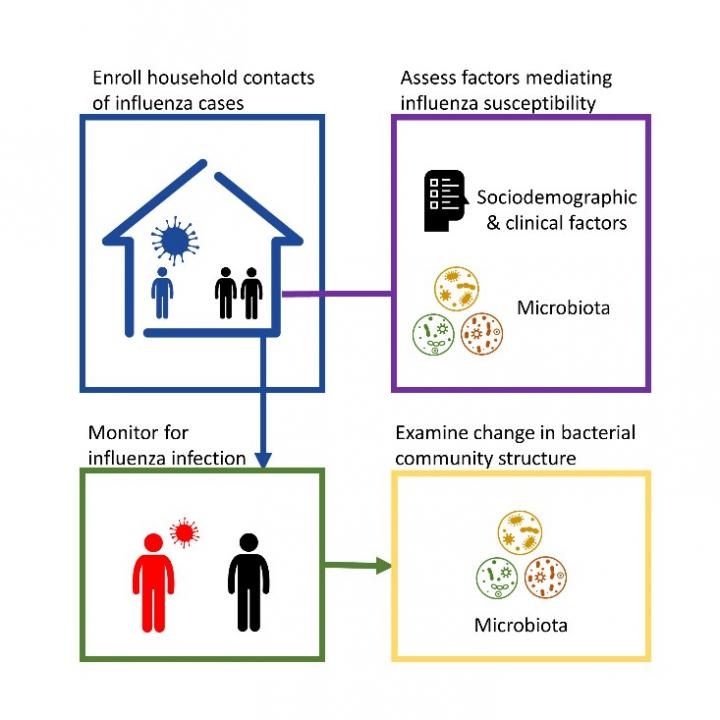Microbiome community linked to lower influenza susceptibility

Credit: Lee et al, 2019.
Specific respiratory microbiome communities may be linked to influenza susceptibility, according to a study published January 9, 2019 in the open-access journal PLOS ONE by Betsy Foxman from the University of Michigan, USA, and colleagues.
Influenza virus, the causative agent of flu, primarily targets the respiratory tract and infects epithelial cells here. The epithelial cells of the nose and throat are enveloped by complex bacterial communities, leading Foxman and colleagues to hypothesize that this respiratory microbiome might interact with the virus – and could play a role in the body’s defences against flu.
In this study, 144 Nicaraguan households with a member identified as having influenza were enrolled between 2012 and 2014 and all household adults and children monitored for up to two weeks. Study staff visited each household five times, sampling the respiratory microbiomes of all household members as well as testing for influenza infection; participants also kept symptom diaries. Using statistical modeling, the authors were able to categorize each participant’s respiratory microbiome into one of five distinct community types at every visit, though approximately half of participants underwent changes in microbiome type between study visits. The authors could then compare participants’ microbiome types to the likelihood of their contracting flu.
One of the five respiratory microbiome community types across age groups clearly demonstrated decreased susceptibility to the flu. This microbiome type was significantly less common in infants and young children, and when present also appeared less stable in these age groups compared to older children and adults. While the link between microbiome and influenza susceptibility was not shown to be causal in this study, the authors suggest that these microbiome differences might contribute to the increased influenza risk observed among young children.
The authors note that the further work could examine whether the high degree of change to microbiome types seen in many participants represents normal variation among healthy individuals or a response to influenza exposure. Nonetheless, the authors believe this is the first human population study to indicate that your respiratory microbiome may affect your susceptibility to flu.
The authors add: “The nose/throat microbiome may be a potential target for preventing the spread of influenza.”
###
In your coverage please use this URL to provide access to the freely available article in PLOS ONE: http://journals.
Citation: Lee KH, Gordon A, Shedden K, Kuan G, Ng S, Balmaseda A, et al. (2019) The respiratory microbiome and susceptibility to influenza virus infection. PLoS ONE 14(1): e0207898. https:/
Funding: Microbiome analysis was supported by the National Institutes of Health (NIH) through the National Institute of Allergy and Infectious Diseases (NIAID) grant R21AI119463 (BF & AG). Data collection was supported by U01AI088654 (AG) and contract number HHSN272201400031C (AG), and a career development award from the Fogarty International Center (K02TW009483 (AG)). Additional funding came from the Tinker Foundation, University of Michigan Center for Latin America and Caribbean Studies, University of Michigan International Institute, and University of Michigan Rackham Graduate School. The funders had no role in study design, data collection and analysis, decision to publish, or preparation of the manuscript.
Competing Interests: The authors have declared that no competing interests exist.
Media Contact
Betsy Foxman
[email protected]
Original Source
http://journals.
Related Journal Article
http://dx.




